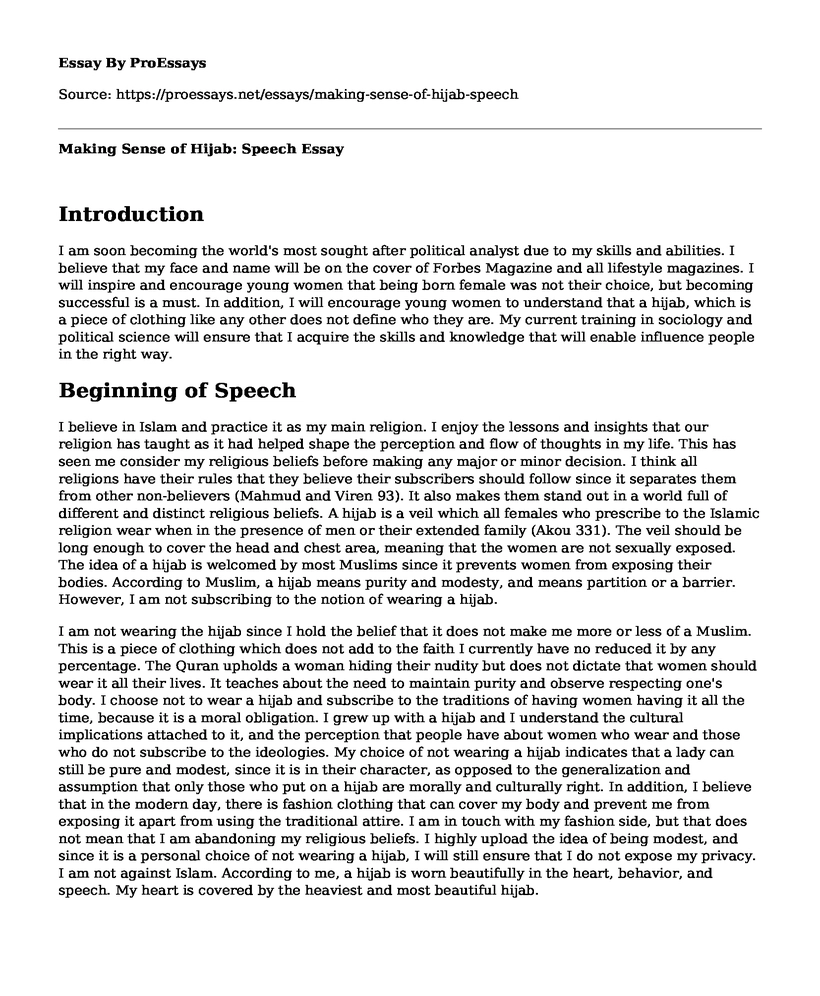Introduction
I am soon becoming the world's most sought after political analyst due to my skills and abilities. I believe that my face and name will be on the cover of Forbes Magazine and all lifestyle magazines. I will inspire and encourage young women that being born female was not their choice, but becoming successful is a must. In addition, I will encourage young women to understand that a hijab, which is a piece of clothing like any other does not define who they are. My current training in sociology and political science will ensure that I acquire the skills and knowledge that will enable influence people in the right way.
Beginning of Speech
I believe in Islam and practice it as my main religion. I enjoy the lessons and insights that our religion has taught as it had helped shape the perception and flow of thoughts in my life. This has seen me consider my religious beliefs before making any major or minor decision. I think all religions have their rules that they believe their subscribers should follow since it separates them from other non-believers (Mahmud and Viren 93). It also makes them stand out in a world full of different and distinct religious beliefs. A hijab is a veil which all females who prescribe to the Islamic religion wear when in the presence of men or their extended family (Akou 331). The veil should be long enough to cover the head and chest area, meaning that the women are not sexually exposed. The idea of a hijab is welcomed by most Muslims since it prevents women from exposing their bodies. According to Muslim, a hijab means purity and modesty, and means partition or a barrier. However, I am not subscribing to the notion of wearing a hijab.
I am not wearing the hijab since I hold the belief that it does not make me more or less of a Muslim. This is a piece of clothing which does not add to the faith I currently have no reduced it by any percentage. The Quran upholds a woman hiding their nudity but does not dictate that women should wear it all their lives. It teaches about the need to maintain purity and observe respecting one's body. I choose not to wear a hijab and subscribe to the traditions of having women having it all the time, because it is a moral obligation. I grew up with a hijab and I understand the cultural implications attached to it, and the perception that people have about women who wear and those who do not subscribe to the ideologies. My choice of not wearing a hijab indicates that a lady can still be pure and modest, since it is in their character, as opposed to the generalization and assumption that only those who put on a hijab are morally and culturally right. In addition, I believe that in the modern day, there is fashion clothing that can cover my body and prevent me from exposing it apart from using the traditional attire. I am in touch with my fashion side, but that does not mean that I am abandoning my religious beliefs. I highly upload the idea of being modest, and since it is a personal choice of not wearing a hijab, I will still ensure that I do not expose my privacy. I am not against Islam. According to me, a hijab is worn beautifully in the heart, behavior, and speech. My heart is covered by the heaviest and most beautiful hijab.
Conclusion
The hijab is part of the teaching in the Quran and does not mention it directly, rather it gives directions on what women should do as they remain modest in their dressing. For instance, men are advised not to look at other women who are not their wives in a lustful way. Women are further advised on covering themselves in a modest way and guard their private parts. In another instance, the Quran insists on taking care of the body. Even though the Quran does not directly say that women should wear a hijab, people choose to wear it as a way to show modesty and avoid displaying their nudity to the crowds. This ensures that men do not lust after women who are not their wives. The situation of hijabs in American was accommodating unlike in the recent past when a woman found with the veil was considered a threat to security. Even though most people do not mind interacting with a lady who wears a hijab, others have their reservations and consider the women unattractive, thereby limiting their ability to enjoy their social life (Akou 346). My famous quote: I believe a hijab is not what you are wearing, but what you and say. It is who you are as a person.
Works Cited
Akou, Heather Marie. "Interpreting Islam through the Internet: Making sense of hijab." Contemporary Islam 4.3 (2010): 331-346.
Mahmud, Yusr, and Viren Swami. "The influence of the hijab (Islamic head-cover) on perceptions of women's attractiveness and intelligence." Body Image 7.1 (2010): 90-93.
Cite this page
Making Sense of Hijab: Speech. (2022, May 03). Retrieved from https://proessays.net/essays/making-sense-of-hijab-speech
If you are the original author of this essay and no longer wish to have it published on the ProEssays website, please click below to request its removal:
- Psycho 1960 Film Analysis Essay
- Nice for What Choreographic Video Evaluation
- The Implications of Industrial Design Towards Green Environmental Sustainability in China
- Film Analysis Essay on "And the Band Played On"
- Essay Example on The Life of Arnold Schoenberg: An Aussie-American Composer's Rise From Humble Beginnings
- Songs Reflect, Depict and Impact Los Angeles - Essay Sample
- Essay example on Quoting vs. Paraphrasing: When to Use Each in an Essay







